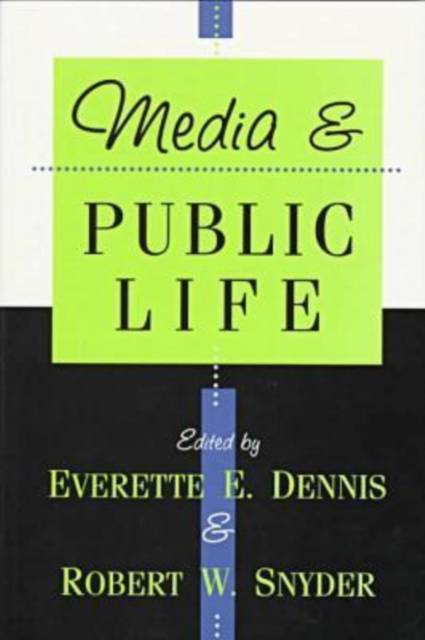
En raison d'une grêve chez bpost, votre commande pourrait être retardée. Vous avez besoin d’un livre rapidement ? Nos magasins vous accueillent à bras ouverts !
- Retrait gratuit dans votre magasin Club
- 7.000.000 titres dans notre catalogue
- Payer en toute sécurité
- Toujours un magasin près de chez vous
En raison de la grêve chez bpost, votre commande pourrait être retardée. Vous avez besoin d’un livre rapidement ? Nos magasins vous accueillent à bras ouverts !
- Retrait gratuit dans votre magasin Club
- 7.000.0000 titres dans notre catalogue
- Payer en toute sécurité
- Toujours un magasin près de chez vous
53,45 €
+ 106 points
Description
For over a decade the Media Studies Journal has joined in the debate about the media and proposed solutions to problems that divide the media and the public. Its contributions by leading figures in print and other media have helped better professional, scholarly, and public understanding of the media's role in society. During this time, the world has experienced vast changes, with the end of the cold war and the rise of democracies and market economies almost every where--conditions that have generally benefited freedom of expression. Media and Public Life is a retrospective of ten years of some of the most arresting published work derived from the Media Studies Journal. Some of the journal's most enduring essays appear in this volume. Among them are: "How Vast the Wasteland Now?" by Newton N. Minow; "In the South--When It Mattered to Be an Editor" by Dudley Clendinen; "Seething in Silence--News in Black and White" by Ellis Cose; "Requiem for the Boys on the Bus" by Maureen Dowd; "The Flickering Images That May Drive Presidents" by Robert MacNeil; and "The Inevitable Global Conversation" by Walter B. Wriston. Media and Public Life reflects the diversity of issues and perspectives that has been a trademark of the Media Studies Journal. The chapters aptly depict the growing field of communication and media studies. Many ideas are taken into consideration, including the great functions of communication (like information, opinion, entertainment, and publicity), trends (such as news in the post-cold war period), and specific industries (such as radio and book publishing). Throughout the book the consequences and impact of media institutions on society and public life are maintained. Media and Public Life will be of value to communications specialists, media studies scholars, and sociologists.
Spécifications
Parties prenantes
- Auteur(s) :
- Editeur:
Contenu
- Nombre de pages :
- 200
- Langue:
- Anglais
Caractéristiques
- EAN:
- 9781560008743
- Date de parution :
- 01-02-96
- Format:
- Livre broché
- Format numérique:
- Trade paperback (VS)
- Poids :
- 340 g

Les avis
Nous publions uniquement les avis qui respectent les conditions requises. Consultez nos conditions pour les avis.






